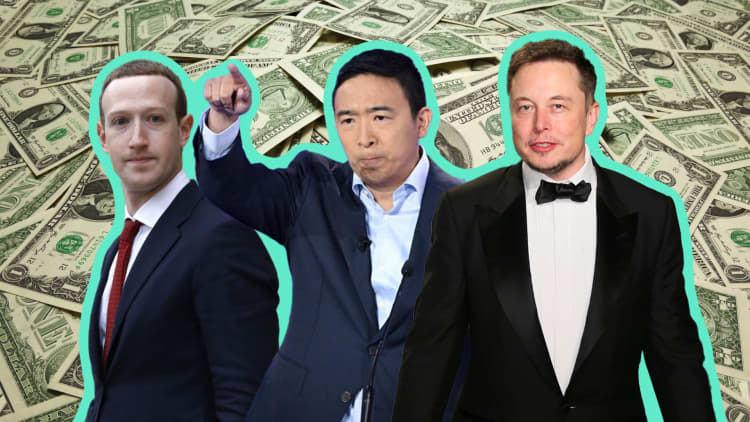As congressional negotiators work to agree on a stimulus package that is set to include cash payments to Americans of up to $1,200 per person, former Democratic presidential candidate Andrew Yang says his new nonprofit will also start giving out checks.
On Friday, Yang's Humanity Forward announced it would be giving away at least $1 million to individuals who have been hard hit by COVID-19 pandemic in an effort called the Humanity Forward Coronavirus Relief Fund.
"The coronavirus crisis has been devastating on so many levels. But right now, the first level is that people are running out of money to be able to feed themselves and their family," said Yang in a video posted on Twitter on Friday.
The money will go to the "working poor," Yang said in the video.
At least $100,000 of the money will be distributed through $250 to $500 microgrants to people who reach out to Humanity Forward's social media channels: $50,000 will be distributed to Twitter followers, $25,000 to Facebook followers and $25,000 to followers on Instagram.
Then Neighborhood Trust Financial Partners, a nonprofit that provides financial coaching in Bronx, New York, will select 1,000 households with whom it works to receive $1,000 each. Those checks will start going out within two weeks, according to Humanity Forward.
"Our clients are home health aides, cashiers, cleaners, and drivers," Neighborhood Trust CEO Justine Zinkin said in a statement, pointing out that these are people who help drive local economies but are now facing financial uncertainty and hardship.
Humanity Forward will also work with One Fair Wage, an organization that helps service workers who need money to pay bills, but it is unclear how much money will be distributed.
"Literally millions of service workers from restaurants and other personal care businesses have been laid off due to COVID-19," Saru Jayaraman, President of One Fair Wage, said in a statement.
Yang gained national attention for campaigning on the promise to give every American citizen over the age of 18 a $1,000 per month cash payment. His universal basic income pitch was predicated on the idea that automation would replace human workers faster than they could be retrained. However the idea has gotten renewed traction in the wake of the coronavirus pandemic, with even politicians from both sides of the fence advocating for cash payments in response to the COVID-19 pandemic.
Indivduals already vying for a check on Twitter listed everything from lost work to medical conditions as reasons they could use the cash.
The inspiration to get cash into the hands of those who need has been spreading in the time of COVID-19 lockdowns.
For example, serial entrepreneur Chris Bakke tweeted on Thursday he would be giving out $10,000 to people who need help paying their bills (and investing or lending $100,000 in small businesses at 0% interest).
And Twitter co-founder Jack Dorsey said on Wednesday his company Square would be giving away cash through its mobile application for giving and receiving money, Cash App.
This story has been updated to include the breakdown of how much Humanity Forward will distribute on each of its social media channels.
See also:
'Americans need cash now:' Coronavirus has lawmakers calling for UBI
Bernie Sanders: 'If you're a multimillionaire...you're going to get through' coronavirus pandemic
Andrew Yang, AOC, Harvard professor: Free cash payments would help during coronavirus pandemic



